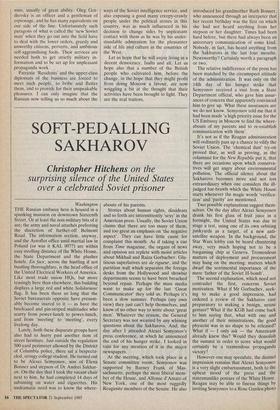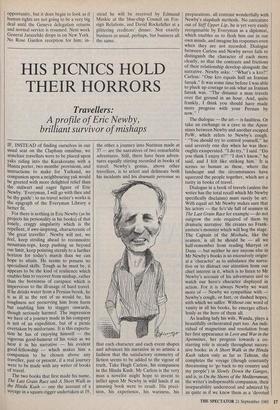SOFT-PEDALLING SAKHAROV
Christopher Hitehens on the
surprising silence of the United States over a celebrated Soviet prisoner
Washington THE Russian embassy here is housed in a spanking mansion on downtown Sixteenth Street. Or at least the non-military bits of it are; the army and naval attaches preferring the discretion of further-off Belmont Road. The information section, anyway, and the Aeroflot office until martial law in Poland (or was it KAL 007?) are within easy strolling distance of the White House, the State Department and the plusher hotels. En face, across the hustling if not bustling thoroughfare, is the head office of the United Electrical Workers of America. Like most trade union HQs, but more teasingly here than elsewhere, this building displays a large red and white Solidarnosc flag. It has been there so long that the Soviet bureaucrats opposite have presum- ably become inured to it — as have the briefcased and pin-striped multitudes who scurry from power-lunch to power-lunch, and from 'meeting' to 'meeting', every livelong day.
Lately, both these disparate groups have also had to hurry past another item of street furniture. Just outside the regulation 500-yard perimeter allowed by the District of Columbia police, there sat a bespecta- cled, stringy college student. He turned out to be Alexei Semyonov, son of Elena Bonner and stepson of Dr Andrei Sakhar- ov. On the day that I took the vacant chair next to him, he had completed 14 days of subsisting on water and cigarettes. His undramatic need was to know the where-
abouts of his parents.
Stories about human rights, dissidents and so forth are intermittently 'sexy' in the American press. Usually, the Soviet Union claims that there are too many of them, and too great an emphasis on 'the negative aspect'. They can have little cause for complaint this month. As if taking a cue from Time magazine, the organs of news and opinion are replete with moist articles about Mikhail and Raiza Gorbachev. Glu- tinous superlatives are de rigueur, and the partition wall which separates the foreign desks from the Hollywood and showbiz departments seems to have been breached beyond repair. Perhaps the mass media want to make up for the last 'Great Communicator' they sold us. Perhaps it's been a slow summer. Perhaps (my own view) they just can't help themselves, and know of no other way to write about 'great men'. Whatever the reason, the General Secretary was not wearied by any whining questions about the Sakharovs. And, the day after I attended Alexei Semyonov's press conference, at which he announced the end of his hunger strike, I looked in vain for any mention of it in the major newspapers.
At the meeting, which took place in a Senate committee room, Semyonov was supported by Barney Frank of Mas- sachusetts, perhaps the most liberal mem- ber of the House, and Alfonse d'Amato of New York, one of the most ruggedly Reaganite members of the Senate. He also introduced his grandmother Ruth Bonner, who announced through an interpeter that her recent birthday was the first on which she had not heard anything from her stepson or her daughter. Times had been hard before, but there had always been an aniversary communication of some kind. Nobody, in fact, has heard anything from the Sakharovs in the last four months. Newsworthy? Certainly worth a paragraph or two.
The relative indifference of the press has been matched by the circumspect attitude of the administration. It was only on the 14th day of his hunger strike that Semyonov received a visit from a State Department official, who gave him assur- ances of concern that apparently convinced him to give up. What these assurances are we do not know. Semyonov told me that it had been made 'a high priority issue for the US Embassy in Moscow to find the where- abouts of my parents and to re-establish communication with them'.
It's not as if the Reagan administration will ordinarily pass up a chance to vilify the Soviet Union. The 'chemical dust' try-on proved that, as well as proving, as the columnist for the New Republic put it, that there are occasions upon which conserva- tives will get angry about environmental pollution. The official silence about the Sakharovs becomes more and not less extraordinary when one considers the ill- judged bar-brawls which the White House starts whenever the magic words 'verifica- tion' and 'parity' are mentioned.
Two possible explanations suggest them- selves. On the day after Alexei Semyonov drank his first glass of fruit juice in a fortnight, the United States was due to stage a test, using one of its own orbiting junkyards as a target, of a new anti- satellite weapon. In the background, the Star Wars lobby can be heard chuntering away, very much hoping not to be a bargaining chip at Geneva. Tremendous matters of deployment and procurement may hang on the meeting: matters which dwarf the sentimental importance of the mere 'father of the Soviet H-bomb'.
The second explanation, which need not contradict the first, concerns Soviet motivation. What if Mr Gorbachev, seek- ing to make a good impression, had ordered a review of the Sakharov case preparatory to making a benign, ursine gesture? What if the KGB had come back to him saying that, what with one and another of their ministrations, the good physicist was in no shape to be released? What if — I only ask — the Americans already knew this? Would they demolish the summit in order to score what would certainly be a tremendous propaganda victory?
However one may speculate, the distinct impression remains that Alexei Semyonov is a very slight embarrassment, both to the upbeat mood of the press and the statesmanlike posture of the White House. Reagan may be able to finesse things by inviting Semyonov to a Rose Garden photo opportunity, but it does begin to look as if human rights are not going to be a very big deal until the Geneva delegation returns and normal service is resumed. Next week General Jaruzeiski drops in on New York. No Rose Garden reception for him; in- stead he will be received by Edmund Muskie at the blue-chip Council on For- eign Relations, and David Rockefeller at a glittering creditors' dinner. Not exactly business as usual, perhaps, but business all the same.















































 Previous page
Previous page